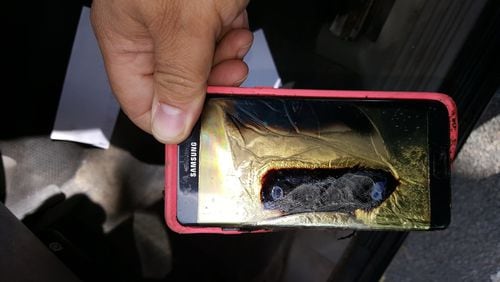On a Delta Air Lines flight from Minneapolis to Atlanta last winter, heavy smoke filled the cabin as the plane arrived at the gate at Hartsfield-Jackson International.
Alarmed passengers opened the plane’s over-wing exit doors and and stood on the wings of the plane while crews extinguished a small fire in the overhead bin at row 13.
The culprit: A laptop battery inside a carryon.
Growing concern about lithium batteries in personal devices catching fire — heightened by problems with a Samsung smartphone model — has prompted airlines including Delta to take steps to reduce the risk of a disaster.
Atlanta-based Delta is equipping its jets with “fire containment bags” that can be used to contain a fire when a cell phone or laptop overheats.
Delta plans to add the bags to its entire fleet, starting with planes that fly overseas flights. It will have the bags on 166 planes by the end of the year, then add them to the rest of its aircraft starting in 2017.
Alaska Airlines earlier this year equipped all its jets with similar bags, which are made of a fire-resistant material and are designed to hold mobile phones or laptops that catch fire.
A flight attendant would use heat-resistant gloves to put the device in the bag to extinguish flames, and zip it shut to contain any heat and flames.
“With passengers using more and more electronic devices on board our aircraft, we needed to have a plan for when those devices act up,” Alaska Airlines’ director of flight safety, Dana Floyd, said in a written statement. “An inflight fire is one of the most dangerous conditions on an aircraft.”
Dallas-based Southwest Airlines, the second-largest carrier in Atlanta behind Delta, said it is also interested in researching options for fire containment devices.
Delta spokesman Morgan Durrant said the gradual addition of bags is “the best possible speed” given the supply, maintenance program changes and training needed.
The airline plans to train pilots and flight attendants to use the bags, which come with gloves.
A total of 129 incidents involving lithium batteries in cargo or baggage have been reported since 1991, but the curve has risen sharply with 23 reported this year. They include the Delta incident involving the laptop battery, when passengers took matters into their own hands and opened the emergency exit doors, according to a Federal Aviation Administration report.
There were 16 incidents in 2015 and nine in 2014.
The risk has gained attention with incidents involving the Samsung Galaxy Note 7 — which Samsung has stopped selling and is recalling. Earlier this month a smoking Note 7 forced a Southwest flight to evacuate at the gate before takeoff from Louisville, Ky.
The U.S. Department of Transportation announced Friday a ban starting at Noon Saturday of all Samsung Galaxy Note 7 devices from airliners.
“We are taking this additional step because even one fire incident inflight poses a high risk of severe personal injury and puts many lives at risk,” Transportation Secretary Anthony Foxx said in a written statement.
FAA incident reports show other devices using lithium battery devices have also led to smoke, fire, extreme heat or explosion — including e-cigarettes, laptops, other cell phones, charging devices, spare batteries, drones, flashlights, personal air purifiers, a curling iron and a lithium-ion battery-powered surfboard.
Delta reported an incident in August in which a passenger’s lithium battery charger in a seat pocket caught fire before takeoff. In another incident a year ago, an e-cigarette overheated in a bag in the cargo compartment as the plane prepared to depart, causing the flight crew to abort the takeoff and evacuate passengers using the emergency slides, according to the FAA report.
The airline said it also has fire extinguishers in airplane cabins, and has long had fire detection and suppression systems in cargo holds.







